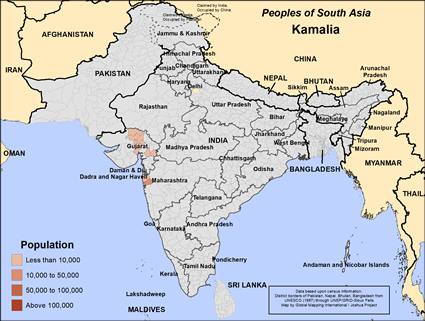The Hindu Kamalia people live in Gujarat, India. Historically, they have been involved in agriculture and textile work, particularly in weaving and cloth production. Over time, the Kamalia adapted to economic shifts, with some moving into other trades and occupations, though many families still depend on traditional crafts and farming. Their long-standing presence in Gujarat connects them to the region's agricultural and textile economy.
Most Kamalia families rely on a combination of farming and textile work for their livelihood. They grow crops like cotton, wheat and millet depending on seasonal rains to sustain their agricultural activities. In addition to farming, many Kamalia continue their weaving traditions, producing textiles for local markets and trade. Some families have diversified into small-scale businesses or labor in nearby towns.
Life in Kamalia villages centers around family and work, with extended families often living close together and cooperating in both farming and craft production. Houses are typically simple, built from locally available materials like mud, brick and thatch. While modern technology has influenced their work, many Kamalia continue to follow traditional methods in both agriculture and textile production.
The Kamalia people practice Hinduism, observing key religious festivals such as Diwali, Holi and Navratri. They worship deities like Vishnu, Shiva and local gods associated with agriculture and weaving. Temples and shrines play an important role in their religious life, serving as places for worship and community gatherings.
Religious practices also include prayers for successful harvests and prosperity in their craftwork. Ceremonies and rituals mark significant life events such as weddings and births, with the community coming together to participate in these observances.
The Kamalia people face challenges related to economic stability, education and access to healthcare. Traditional farming methods leave them vulnerable to environmental changes such as droughts, which can negatively affect both crop production and income from weaving. Improved access to modern farming tools, irrigation systems and market opportunities for their textiles would help enhance their livelihoods.
Education remains a critical need, as many Kamalia children lack access to quality schooling, especially in rural areas. This limits their ability to explore alternative careers and improve their economic standing. Healthcare services are also limited, with many families having to rely on traditional remedies or travel long distances for medical care.
Development initiatives that focus on improving education, healthcare and economic opportunities—while providing support for modernizing farming and textile practices—would significantly benefit the Kamalia people.
Pray for the spiritual lives of the Kamalia people to be defined by faithfulness to Jesus Christ.
Pray for gospel workers to catch a vision for reaching the Kamalia people for Jesus and that in God's sovereign timing their hearts would be open and ready to follow him.
Pray for Jesus movements to bless extended families so the gospel will spread rapidly among this people group.
Scripture Prayers for the Kamalia in India.
Ethnologue: Languages of the World
Reports from Indian NGOs on rural and craft communities in Gujarat
Academic research on textile production and agriculture in Gujarat, India
| Profile Source: Joshua Project |











